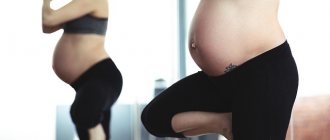The dangers of being overweight during pregnancy
The main reason is the accumulation of scientific data on the harm that excess weight causes to the expectant mother and child.
What negative consequences of obesity of an expectant mother have been proven so far and make experts lean towards the possibility of weight loss during pregnancy? Risks and consequences for the mother:
· initial reduction in the chances of pregnancy with obesity;
risk of gestational (pregnancy-related) diabetes mellitus;
· hypertension with edema as a consequence of the need for the heart to pump blood through an excess number of vessels;
· the risk of developing preeclampsia, eclampsia - severe, sometimes fatal conditions associated with a combination of excess weight, hypertension, edema and other clinical manifestations;
· possible weakness of labor, more severe course of labor (including due to a large fetus).
Risks and consequences for the child:
· large fetus: an increase in the mother’s body weight for every 5 kg leads to a risk of an increase in the child’s body size by 30% at the time of birth, which in turn leads to difficulty during childbirth and increases the chances of injury;
· increased risk of fetal development defects;
· difficulties with breastfeeding, as a result of which the child may not receive the necessary nutrients;
· predisposition to weight gain by the child himself as he grows up.
Thus, when assessing all existing risks, most doctors are inclined to recommend that expectant mothers plan a pregnancy and enter this important phase of life with a normal weight. If a woman becomes pregnant and is overweight, the doctor may recommend a special nutritional system in which the fat mass will be reduced and the fetus will receive all the substances it needs.
Should pregnant women lose weight?
Women who are in an interesting position do not need to lose weight. However, obesity negatively affects the health of the expectant mother and child, so it is worth limiting yourself in food and moving more. Gynecologists categorically prohibit going on strict diets; losing weight in the early stages of pregnancy is especially dangerous. It is unacceptable to lose weight before childbirth, because the body needs strength before such a serious process. It is important to think not only about the figure and kilograms, but also about the baby.
There are exceptions in any case - this is obesity, in which the doctor recommends the expectant mother to lose extra pounds. No one will prescribe a special diet without special indications. This is required only if the health of the woman or fetus is threatened. An indication may be a high probability of blood loss during childbirth or miscarriage, varicose veins, or pathologies of the endocrine system.
Additional Information. As a rule, after the birth of a child, excess weight goes away. Many people manage to lose weight immediately after maternity hospital or during lactation. To the question “Is it possible to lose weight during pregnancy?” specialists answer negatively - this is not welcome either in the early or late stages.
Normal weight gain
First of all, it should be remembered that during a normal pregnancy, a woman who is not overweight should gain about 12 kg in 9 months due to the weight of the baby, the placenta, additional blood, other physiological fluids, and also some amount of fatty tissue. Moreover, there are clearly defined standards for weight gain during pregnancy, which guide doctors when assessing body weight status.
Experts from the European Association for the Study of Obesity recommend that if you have a body mass index of 30-35 (grade 1 obesity), you gain 5-9 kg during pregnancy. With an index of 35-40 (2nd degree obesity), gain from 1 to 5 kg of weight. And if the index is above 40 (grade 3 obesity), do not gain weight at all during pregnancy. This means that with the inevitable weight gain due to physiological parameters, the same 12 kg (due to fetal weight, etc.) should leave a woman’s body with up to 12 kg of fat, which will have a positive impact on the course of pregnancy itself, as well as childbirth with postpartum period.
| BMI | Recommended weight gain during pregnancy |
| Less than 18.5 | 13-18 kg |
| 18,5-24,9 | 11-15 kg |
| 25-29,9 | 8-12 kg |
| 30-35 | 5-9 kg |
| 35-40 | 1-5 kg |
| More than 40 | 0 |
Normal weight during pregnancy
During pregnancy, every woman gains weight. Some people write in reviews on forums that they have gained 10 kg, while others have gained 25-30 kg. However, there is a norm - during pregnancy with one child, the increase is approximately 8-14 kg, with multiple births it can reach 21-23 kg.
| Initial weight (before pregnancy) | Minimum | Maximum |
| Inadequate | 12.5 kg | 18 kg |
| Normal | 11.5 kg | 16 kg |
| Excess | 7 kg | 11.5 kg |
| Obesity | 5 kg | 9 kg |
Pashkova Alla Valerievna
Obstetrician-gynecologist, candidate of medical sciences.
Ask a Question
Depending on individual characteristics, indicators vary. There are calculators for calculating body weight, but it is better to clarify this information with the doctor managing the pregnancy.
The principle of losing weight
To reduce the level of adipose tissue in the body, it is necessary to reduce (or at least not increase) the level of energy intake. The average female metabolism is about 1500 kcal per day, but can range from 1200 to 1900 kcal per day. To accurately measure this parameter, it is better to use studies such as bioimpedansometry or a gas analyzer method for measuring metabolism. It is known that for a noticeable breakdown of adipose tissue (at least 100 grams per day), it is necessary to create a difference between consumed and expended energy of at least 500-700 kcal. How to achieve the desired result of increasing the amount of nutrients while decreasing the amount of incoming energy?
Perhaps the best option is to practice keeping a food diary with daily calorie counting in order to make sure of its required level. At the same time, we remind you that this same level can be accurately calculated only after performing bioimpedance measurements or gas analyzer measurements of basal metabolism. In parallel with calorie counting, it would be correct to track the amount of key foods for each trimester in a food diary, as indicated above. Vegetable salads, fruits, lean meat and fish, seafood with a small amount of bread or potatoes can be an excellent diet for an expectant mother.
Another beneficial dish with this diet would be regular soup. Due to their beneficial composition and large amount of water, soups are low-calorie dishes; they are well suited for an individual menu for anyone who is watching their weight, including pregnant women.
One of the nutritional problems for pregnant women can be taste perversion, or PicaChlorotica. This is a condition when a woman’s taste sensations and preferences change, as a result of which the previously familiar diet can become tasteless and even cause nausea and disgust. This situation can create real problems when forming a diet, since it not only removes from a woman’s diet some of the products necessary for a balanced diet (for example, meat), but can also lead to a craving for relatively edible or generally inedible products, such as chalk, pencil leads or chicken shell. By the middle of the 3rd trimester, this situation usually ends.
Prevention of excess body weight in pregnant women.
Obesity is not only an excessive accumulation of adipose tissue in the body, it is a chronic, severe disease that contributes to the formation of other severe pathologies affecting all organs and systems in the body. If we are talking about excess body weight in pregnant women, then this disease can have a negative impact on the development of the fetus. The nature and severity of the consequences for the expectant mother and the developing child directly depends on the degree of obesity. Only the right approach to the treatment of excess body weight will help avoid negative health issues.
Causes of excess weight during pregnancy
The key etiological factor leading to obesity both before gestation and during pregnancy is an energy imbalance, in which energy intake from food exceeds its expenditure. In 95% of cases, the cause of a positive energy balance is incorrect nutritional habits with the consumption of large amounts of high-calorie foods with a high glycemic index and physical inactivity. Hereditary predisposition plays a certain, but not leading role in maintaining excess weight. In 5% of patients, the disease develops against the background of endocrine and metabolic disorders: genetic failure of enzymes that regulate fat metabolism, cerebral disorders, diseases of the adrenal glands, ovarian failure, hypothyroid conditions. During pregnancy, a number of additional factors arise that contribute to the accumulation of excess fatty tissue:
- Hormonal changes. To maintain gestation and maintain the necessary activity of anabolic processes in the pregnant woman’s body, the secretion of estrogen, progesterone, and prolactin increases, which stimulate lipogenesis. The formation of excess fat is also enhanced by a decrease in tissue sensitivity to insulin, an increase in its concentration in the blood, and hyperproduction of the peptide hormone ghrelin, which stimulates appetite.
- Decreased physical activity. Additional stress experienced by a woman during pregnancy leads to increased fatigue and a feeling of malaise. The situation is aggravated by the development of gestosis, anemia of pregnant women, exacerbation of chronic infections, and extragenital pathology. Patients who perceive gestation as a pathological condition become less mobile and, as a result, spend less energy.
Significant weight gain during pregnancy can be caused by an increase in circulating blood volume, the formation of the placenta and membranes, fetal growth, polyhydramnios, and fluid retention in the body. However, such changes are usually not accompanied by increased lipogenesis. The development of true obesity with the formation of excess adipose tissue directly in the gestational period or after it is provoked by a slowdown in basal metabolism during pregnancy hypothyroidism and postpartum thyroiditis.
Normal weight gain for the entire period of bearing a child is from 8 to 12 kg. If before pregnancy a woman had a problem with extra pounds, then the permissible weight gain should be no more than 6 kg. If a woman experiences a sudden increase in weight, this may indicate fluid retention in the body associated with preeclampsia. Very often, obesity during pregnancy occurs against the background of endocrine disorders such as diabetes mellitus and diencephalic pathology. Before using all kinds of methods for correcting excess weight, every pregnant woman needs to make sure that excess weight is caused precisely by the accumulation of adipose tissue, and not by fluid retention in the body. Expectant mothers who have problems with excess body weight, during registration at the antenatal clinic, undergo laboratory tests and consultations with specialists to detect disturbances in carbohydrate metabolism with a view to their further correction.
Complications:
If a pregnant woman is obese, this condition can pose a serious threat to her condition, as well as to the body of the developing fetus. In addition, excess body weight can cause irreversible consequences for the process of bearing a child. An obese pregnant woman is at potential risk for the following complications:
- Gestational form of diabetes. Excessive accumulation of extra pounds in the body of the expectant mother leads to the formation of diabetes mellitus, which is difficult to correct;
- Post-term pregnancy. Very often, against the background of obesity of the 1st degree and above, women experience an increase in the period of bearing a child;
- Infectious and inflammatory diseases of the genitourinary tract. In pregnant women with excess body weight, the risk of developing urogenital infectious and inflammatory diseases, which can cause spontaneous or premature termination of pregnancy, increases significantly;
- Problematic delivery. Often, obesity is an indication for induction of labor. In addition, overweight pregnant women are more likely to require painkillers to ease contractions;
- Preeclampsia. Due to the accumulation of excess adipose tissue in the body, women's blood pressure increases and protein particles are observed in a general urine test. This condition poses a threat to both mother and child;
- Impossibility of natural childbirth. A large number of extra pounds is an obstacle to standard childbirth. For such women, a caesarean section is more often recommended. It is important to consider that obese mothers are at high risk of intraoperative and postoperative scar suppuration. In case of repeated pregnancy, such patients do not have the opportunity to give birth naturally;
- Thrombosis of large vessels. Excess body weight during pregnancy leads to a deterioration in the rheological properties of blood, with the subsequent formation of blood clots in the lumen of blood vessels;
- Large fruit. An increase in the size of the fetus is usually caused by the development of diabetes mellitus in a pregnant woman. If the child’s weight exceeds 4 kg, then such a woman is recommended to undergo surgery such as a cesarean section;
- Frozen pregnancy. Excess body weight is one of the potential causes of intrauterine death of the ovum in early gestation;
- Spontaneous or premature termination of pregnancy. Another extremely serious complication of obesity during pregnancy is the so-called perinatal mortality. The incidence of this complication in overweight mothers is at least 15%. The main cause of this complication is premature detachment of a normally located placenta.
- In addition, women with a similar diagnosis often experience postpartum hypotonic bleeding, which is caused by impaired blood clotting ability. Such situations most often affect pregnant women whose synthetic liver function is impaired due to excess body weight.
Obese pregnancy itself is a risk. In addition, it is difficult for such women to become pregnant without additional medical care. In addition to complications on the part of the mother’s body, such a serious condition leads to the formation of the following consequences on the part of the child’s body: Congenital anomalies of fetal development. Excessive body weight of a pregnant woman is a predisposing factor in the development of such intrauterine anomalies as malformations of the valvular apparatus of the child’s heart, as well as defects in the structure of the neural tube, leading to pathologies of the central nervous system; Chronic diseases of organs and systems, such as cardiac pathologies, autoimmune diseases and diabetes; Macrosomia. The development of obesity in pregnant women can cause an increase in the weight of the developing child. In the future, such children are prone to accumulating excess body weight.
TREATMENT
Complex therapy for obesity during pregnancy consists of increasing the mobilization of fats from the so-called depots, as well as reducing the energy value of consumed foods. The practice of so-called therapeutic fasting is strictly prohibited during pregnancy, since these experiments lead to a deterioration in the general condition of the mother, the development of iron deficiency anemia, and the formation of fetal developmental abnormalities. Regardless of the degree of accumulation of extra pounds in a pregnant woman’s body, her diet should contain fermented milk products, chicken eggs, meat and fish. These food products have a supply of essential microelements that ensure the harmonious development and growth of the unborn child. The key points of a healthy diet for obesity are rationality and balance. Meals should be taken in small portions 5-6 times a day. Following the correct dietary recommendations will allow you to restore impaired metabolic processes, as well as create a negative energy balance. The primary task for the expectant mother is to limit calories by reducing the consumption of carbohydrate foods. The optimal amount of calories for a pregnant woman is up to 2500 kcal. The carbohydrate component should be compensated by eating foods such as fresh berries, vegetables, wholemeal bread, and fruits (with the exception of highly allergenic ones). Restrictions include confectionery, berry and fruit jams, honey and fresh baked goods. Although overweight pregnant women need to limit carbohydrates, a sharp reduction in the amount of carbohydrate foods consumed can lead to the transformation of proteins into carbohydrate compounds. Such a process will not benefit the body of the expectant mother. The fatty component of the diet should be compensated by consuming butter and vegetable oils. Products such as margarine, spreads, beef and pork fat should be completely excluded from the diet. In addition, a pregnant woman’s body must receive the required amount of proteins, since these elements are not only building materials for the whole body, but are also a structural part of hemoglobin. Protein deficiency in the body is one of the main causes of anemia during pregnancy. It is recommended to get the protein component from products such as whole milk, low-fat fish and meat, as well as chicken or quail eggs. Particular attention should be paid to the amount of table salt consumed. Its excess leads to excessive accumulation of fluid in the body, with a subsequent increase in body weight. The daily allowable amount of salt is no more than 5 g. If the expectant mother follows a balanced diet, her weight gain during the second half of pregnancy does not exceed 300 g every 7 days. For an expectant mother with excess body weight, so-called fasting days are useful, which include the consumption of fermented milk products, fruits and fruit juices. The frequency of fasting days should be no more than once every 7 days. During this day, it is permissible to consume no more than 600 g of low-fat cottage cheese, 1-2 glasses of low-fat kefir and tea without sugar. Eating fresh and baked apples without added sugar is beneficial. In addition to the above-mentioned dietary recommendations, an obese pregnant woman is recommended to perform therapeutic exercises, the purpose of which is to activate metabolic processes in the body and increase fat utilization. The selection of appropriate exercises and their frequency is carried out on an individual basis, taking into account the advanced state of the pathological process and the presence of concomitant diseases in the pregnant woman. During complex therapy for obesity, every expectant mother is recommended to constantly monitor blood glucose levels.
PREVENTION
If the expectant mother does not want to face the problem of obesity, then she is advised to follow simple rules that are aimed at maintaining metabolic processes in the body. These rules include:
- In the case of a hereditary predisposition to gaining excess body weight, every pregnant woman is recommended to follow a rational and balanced diet. This diet involves eating fresh fruits and vegetables, as well as limiting pasta, bakery and confectionery products. In addition, meals should be divided into 5-6 times;
- Therapeutic gymnastics classes selected by the attending physician on an individual basis;
- Timely medical registration in the antenatal clinic. This procedure must be implemented before the 12th week of gestation;
- Constant observation by a specialist obstetrician-gynecologist;
- Introduction of a categorical ban on the consumption of alcoholic beverages and smoking.
Bibliography
- “Women's consultation” - Prof. V.E. Radzinsky
- “Obstetrics” - G.I. Gerasimovich
- “Obstetrics” - E.K. Aylomazyan
Dimitrieva Tatyana Mikhailovna –
obstetrician-gynecologist, 2nd qualification category
antenatal clinic
clinic No. 4
Physical activity
It is necessary to understand that changes in nutrition during pregnancy are only part of the complex changes that occur with a woman during this period. The absolute rule should be to give up smoking and drinking alcohol, as well as increase physical activity (if it was previously low) to the level of 8-10 thousand steps daily and at least half an hour a day for moderate physical activity (such as special gymnastics for pregnant women or swimming).
The topic of physical activity is often discussed on forums for expectant mothers. According to reviews, by increasing the duration of walking and doing home exercises for pregnant women, you can not only reduce excess weight, but also cope with chronic fatigue, mood swings, and toxicosis.
How to choose a bra during pregnancy
Doctors believe that there is no urgent need to use specialized underwear for pregnant women. The main thing is that it does not squeeze the chest.
- Breasts grow in the 1st and 2nd trimesters, only reaching the size that will remain during the feeding period by the 3rd.
- You can choose the same bras for pregnant and nursing women and immediately buy bras that need to be partially unfastened for breastfeeding.
- When choosing a bra, it is important to pay attention to the fabric composition: cotton and lycra are preferable. Such underwear stretches when necessary without causing discomfort. The straps should be wide and the cups should cover the entire chest. There is no need to choose bras with underwires: they can move and pinch the duct during breastfeeding.
- From the second trimester, colostrum may be released from the nipples - use special bra inserts.
- How many bras should you buy? As a rule, women during pregnancy and lactation need three special bras.
Psychological support
It is very important to maintain psycho-emotional balance during pregnancy. For this purpose, meditation, yoga, and special breathing practices are used, which can be studied in special courses for pregnant women.
But a woman who also needs to solve the problem of excess weight during this period may need the help of a professional psychologist involved in psychocorrection of eating behavior. The fact is that losing weight is generally difficult - eating habits that have been fixed over the years, as well as psychological barriers and complexes, interfere. During the period of bearing a child, when “hormones play”, mood often changes, the perception of tastes and smells is distorted, this may seem completely impossible.










